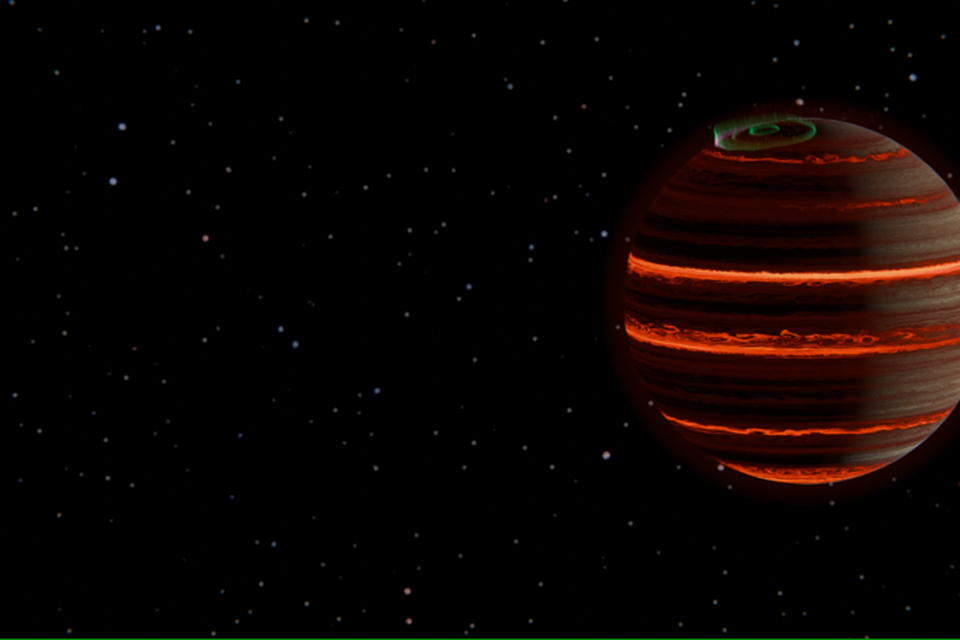Science
Trinity College Astronomers Unveil Aurora on Distant Planet

Astronomers at Trinity College Dublin have detected an aurora, reminiscent of Earth’s Northern Lights, surrounding a planet located approximately 20 light years away. This discovery was made possible through observations using the James Webb Space Telescope (JWST) by a research team led by Johanna Vos, Associate Professor of Physics at the university. The planet, known as SIMP-0136, exhibits an atmospheric phenomenon that expands our understanding of weather patterns on distant worlds.
The aurora effect, typically caused by interactions between charged particles from the Sun and atmospheric gases, creates stunning light displays in polar regions on Earth. Professor Vos remarked, “We suspected that there was an aurora on SIMP-0136 from earlier radio observations, but we didn’t anticipate being able to confirm it with the JWST.” The precision of the JWST facilitated detailed measurements of temperature variations within the planet’s atmosphere.
Key Findings on SIMP-0136’s Atmosphere
Observations revealed that, contrary to expectations that temperatures would decrease at higher altitudes, there was a surprising increase in temperature at certain points. Professor Vos explained, “We are only able to explain this phenomenon by heating from an aurora.” Current estimates suggest that temperatures on SIMP-0136 exceed 1,500 Celsius, yet Professor Vos identified subtle temperature changes of less than 5 Celsius linked to variations in the planet’s atmospheric composition.
These changes suggest dynamic weather patterns akin to storms observed on Jupiter, such as the Great Red Spot. Another unexpected finding was the continuous cloud coverage enveloping SIMP-0136. Unlike Earth, where clouds consist of water droplets and ice crystals, the clouds on this distant planet appear to be composed of silicate grains, comparable to sand.
Implications for Exoplanet Research
The research team, known as the Exo-Aimsir Group, aims to deepen the understanding of weather phenomena on exoplanets beyond our Solar System. Since the first exoplanets were confirmed in 1992, over 6,000 such planets have been identified. Professor Vos emphasized the significance of these studies, stating, “Basic research into astronomy can lead to unexpected technological advancements, from Wi-Fi to microwaves and GPS satellites.”
She further elaborated on the broader implications of their findings, stating, “This is really just the beginning of understanding the weather on other worlds. We could see how things change as SIMP-0136 rotates, but in the long term, we want to understand the atmospheric dynamics.” The research team hopes to uncover whether stable storms exist on SIMP-0136, their structure, and how they compare to phenomena observed in our own Solar System.
The study was published in the journal Astronomy and Astrophysics on October 12, 2023. As scientists continue to explore the atmospheres of distant planets, they inch closer to answering fundamental questions about the universe and the potential for life beyond Earth.
-

 Top Stories3 months ago
Top Stories3 months agoTributes Surge for 9-Year-Old Leon Briody After Cancer Battle
-

 Entertainment4 months ago
Entertainment4 months agoAimee Osbourne Joins Family for Emotional Tribute to Ozzy
-

 Politics4 months ago
Politics4 months agoDanny Healy-Rae Considers Complaint After Altercation with Garda
-

 Top Stories4 months ago
Top Stories4 months agoIreland Enjoys Summer Heat as Hurricane Erin Approaches Atlantic
-

 World5 months ago
World5 months agoHawaii Commemorates 80 Years Since Hiroshima Bombing with Ceremony
-

 Top Stories3 months ago
Top Stories3 months agoNewcastle West Woman Patricia Foley Found Safe After Urgent Search
-

 Top Stories5 months ago
Top Stories5 months agoFianna Fáil TDs Urgently Consider Maire Geoghegan-Quinn for Presidency
-

 World5 months ago
World5 months agoCouple Convicted of Murdering Two-Year-Old Grandson in Wales
-

 World5 months ago
World5 months agoGaza Aid Distribution Tragedy: 20 Killed Amid Ongoing Violence
-

 World5 months ago
World5 months agoAristocrat Constance Marten and Partner Convicted of Infant Murder
-

 Top Stories4 months ago
Top Stories4 months agoClimbing Errigal: A Must-Do Summer Adventure in Donegal
-

 Top Stories4 months ago
Top Stories4 months agoHike Donegal’s Errigal Mountain NOW for Unforgettable Summer Views









